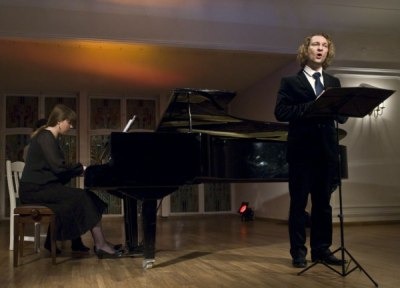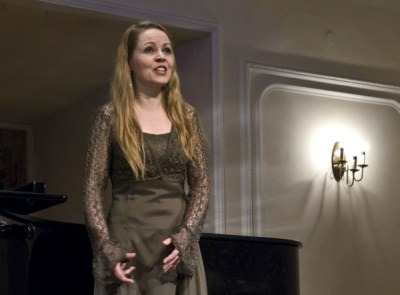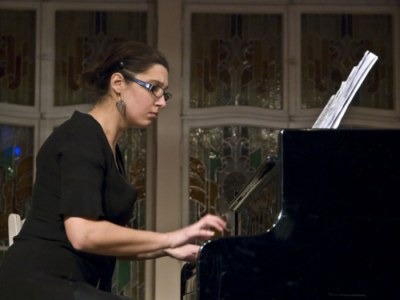R.SCHUMANN: CONFRONTATION OF FEMININITY AND MASCULINITY 0
P.Gudinaitė and M.Zimkus. Photo of KMN (by A.Urbonas)
E.Čičinskaitė. Photo of KMN (by A.Urbonas)
G.Spečkauskaitė. Photo of KMN (by A.Urbonas)
In brief: Pathos and logos, yin and yang, femininity and masculinity, anima andanimus. Many similar contrasting images exist in various cultures. By the way, they are not only opposed but constantly compared with each other. The vocal cycles of Robert Schumann “Woman's Love and Life” and “Poe's Love” may be attributed to them in a certain way. These cycles were performed at Kaunas Artists' House on the 14th of December by Eglė Čičinskaitė and Mindaugas Zimkus with the accompaniment of pianists Giedrė Spečkauskaitė and Paulė Gudinaitė.
According to the distribution pathos-logos, the vocal cycles“Woman's Love and Life” and “Poet's Love” correspond to the title; still, they are more inclined to pathos by the musical language, themes and texts.
The first cycle “Woman's Love and Life” was performed by two young ladies: pianist G.Spečkauskaitėand vocalist Eglė Čičinskaitė, who are both students of the Lithuanian Academy of Music and Theatre. The transparent, soft and composed voice of E.Čičinskaitė made a pleasant impression from the first notes already. However, her voice was too restrained for such a music piece. Most probably the voice and the peaceful character of the singer herself could be the causes. Also, the author of the article missed the equivalent duet of the pianist and vocalist in the performance of “Woman's Love and Life”.
Meanwhile, the second part of the concert differed from the moderate first part greatly. The cycle “Poet's Love” was interpreted by the vocalist M.Zimkus and P.Gudinaitė. The performers presented a wide scale of emotions and musical shades and joined the romantic emotionality with rational performance. The interpretation of M.Zimkus was highly philosophical and colourful emotionally and dynamically. At the same time the performance was chamber. The young pianist P.Gudinaitė surprised the author pleasantly; unfortunately, she remained in the second plan during the concert.
The author mentions one more important fact in the article: the concert was dedicated to the 200th birth anniversary of R.Schumann. A question arises why the concert was organised in December even though the composer was born in June. Also, the verbal honouring of the composer was slightly arid and not so informative.
In conclusion, the concert was broken into three separate parts: two different duets and the announcer of the evening. Still, the evening was really warm: each participant of the concert performed sincerely, and the audience accepted their concert with applause.



